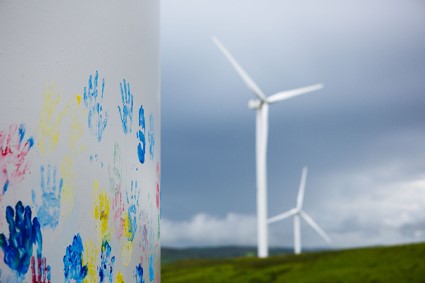Wind Energy Industry Calls for New Measures to Allow General Public and Small Investors Invest in Irish Wind Energy Projects
09 October, 2014
 Vision, leadership and ongoing commitment required to realise the economic and social potential of indigenous clean energy, says IWEA CEO
Vision, leadership and ongoing commitment required to realise the economic and social potential of indigenous clean energy, says IWEA CEO
9th October 2014 - The Irish Wind Energy Association (IWEA) has called on the Government to further incentivise investment in Irish wind energy by putting in place a range of new measures that would enable the general public, communities and small investors invest in the €3.5bn worth of Irish wind energy schemes already planned in Ireland and required to meet the country’s 2020 targets, it has been revealed at the Association’s annual conference in Kilkenny.
The incentives proposed by IWEA in its recent budget submission and in its recent submission to the government’s Green Paper on Ireland’s energy future include:
• Allowing individuals to claim tax relief for investing sums ranging from €100 to €10,000 with local financial institutions and credit unions to be used for investment in certified renewable energy projects such as wind farms.
This would include the launch of a new alternative Incentive Scheme creating the opportunity for low to medium income earners to claim tax relief on investments in renewable energy projects with a 5-7 year return period.
• Universal Social Charge relief for those investments within the lower end of the investment scale from €250.
• New schemes to encourage further wind micro generation of electricity similar to European schemes that IWEA believes would provide a significant stimulus for a broader societal approach to Ireland’s energy policy and help address climate change.
Kenneth Matthews, CEO of IWEA, said: “Despite considerable interest, currently individuals and communities in Ireland have limited ability to invest in renewable energy projects. Working together with the Government and other key stakeholders we are interested in creating more opportunities for members of the public and small investors as we believe this will help stimulate investment and economic growth, help Ireland reach its 2020 targets, promote a low carbon economy and further enhance social acceptance for wind energy projects.”
Matthews points out that the proposals would mirror moves in other countries such as the UK where crowd financing platforms for renewable energy project have been oversubscribed by smaller non-traditional investors.
“There are a growing number of examples abroad of funds and funding platforms raising considerable amounts of money from people investing on average £5,000 and some as little as €100 in renewable projects. By doing so they are earning attractive interest rates and building a nest egg for the future, whilst doing something really important for society and helping generate more clean energy.”
Matthews maintains that the Government, business leaders and environmentalists need to show vision, clear leadership and commitment to ensure Ireland continues to pursue a sustainable energy future through the continued development of renewable sources of energy.
“The words of An Taoiseach, Enda Kenny, at the UN climate summit in New York now need to translate into real action here at home. Ireland is at a cross-roads with regards to its energy policy. Our abundant renewable energy resources present a fantastic opportunity to pursue a sustainable energy future and at the same time realise a phenomenal economic opportunity. However, we can only deliver on this opportunity if the Government and other key parties show the vision, leadership and commitment required to ensure wind energy development can progress in Ireland and that we don’t fail in meeting our 2020 targets.”
Currently there are 3,400 people directly employed in wind energy in Ireland and Independent research published earlier this year by leading international consultancy firms Pöyry and Cambridge Econometrics demonstrated that by installing the wind capacity required to meet Ireland’s 2020 targets and developing a further 1.6GW between 2020 and 2030, to meet domestic energy demand, would deliver €8.3 billion of investment into the Irish economy, significantly contribute to economic growth and provide at least €1.8bn additional cumulative tax revenue to the Irish State. It also highlighted it would lower wholesale electricity prices, lead to no additional cost to Irish consumers and save Ireland €700 million per year in fossil fuel imports and reduce the country’s dependency on energy imports.
Ends
For more information:
Ben Valdimarsson
ReputationInc
Tel: 01 4120512
About IWEA
Established in 1993, the Irish Wind Energy Association (IWEA) is the national body representing the wind energy sector in Ireland. IWEA is committed to promoting the use of wind energy in Ireland and beyond as an economically viable and environmentally sound alternative to conventional generation and promotes awareness and understanding of wind power as the primary renewable energy resource. IWEA is also dedicated to education and awareness building, and to building the skills base of the renewable energy sector in Ireland. IWEA also supports the development of other renewable technology, particularly marine energy. IWEA has more than 200 members who incorporate all leading industry voices in Ireland. IWEA acts as a central point for information for its membership as well as a voice to promote wind energy to government. IWEA is entirely self-funded and relies on the support of its members.
For more information, please visit http://www.iwea.com
